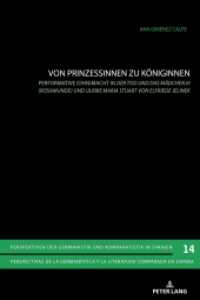- ホーム
- > 洋書
- > ドイツ書
- > Humanities, Arts & Music
- > Psychology
- > practical psychology
Full Description
In a world where the global engagement and international dialogue intensifies, some areas of cultivated knowledge suffer from this dialogue and this has consequences for people and communities. We propose education to be such a case. The global dialogue in education tends to be restricted to and mediated by standardized measurements. Such standards are meant to measure qualities of education and of student behavior and create the sought for condition for normative comparability and competition. The obvious drawback is that cultural variability - in local living as well as in education - is rendered irrelevant. Are there alternatives? The book insists on maintaining the discussion about education on a global level, but rather than moving towards homogenization and standardization of education, the attention is drawn towards the potential for learning from creative fits - and misfits - between concrete local cultures, institutional practices and global aims and standards of education.
This work brings together a group of educational and developmental researchers and scholars grappling to find culturally informed and sensitive modes of educating people and communities. Case studies and examples from four geographical contexts are being discussed: China, Brazil, Australia and Europe. While being embedded in these local cultures, the authors share a conceptual grounding in cultural developmental theorizing and a vision for a culturally informed globalized perspective on education. As the theme of the book is learning from each other, the volume also includes commentaries from leading scholars in the field of cultural psychology and education.
Contents
Part I: Perspectives on the challenge of globalization.- Ch 1. Education, competition and cultural development.- Ch 2. What is disruptive about disruptive behavior?.- Ch 3. Buildung, motivation, and deliberative democracy in primary education.- Ch 4. Commentary To Part 1: Perspectives on the Challenge of Globalization.- Part II: Constructing Culturally Responsive Education.- Ch 5. Cultural Security in Australian Classrooms: Entanglements with Mainstream Education as Aboriginal and Torres Strait Islander Children Transition to School.- Ch 6. A Cultural-Historical Model to Inform Culturally Responsive Pedagogies: Case Studies of Educational Practices in Solomon Islands and Australia.- Ch 7. Nhembo'ea reko regua: trajectories of the Mbya Guarani struggles for a differentiated education.- Ch 8. Education for beauty in the Laje Collection and the emergence of creative work at the outskirts of Salvador, Brazil.- Ch 9.Commentary to PartII: Constructing culturally responsive education.- Part III: Educational cultivation of personal lives.- Ch 10. Identity in education and education in identities. Connecting curriculum and school practice to students' lives and identities.- Ch 11. Using symbolic resources to overcome institutional barriers: a case study of an Albanian-speaking young woman in Switzerland.- Ch 12. Teacher identity in structural reflective workshops: A view from China.- Ch 13. Children's development - between personal engagements and curriculum based pre-school practices.- Ch 14. Commentary to Part III: Cultural perspectives on self/identity issues, prejudice and symbolic resources.- Ch 15. Editors' conclusion: Imagining an education for 'good life'.







